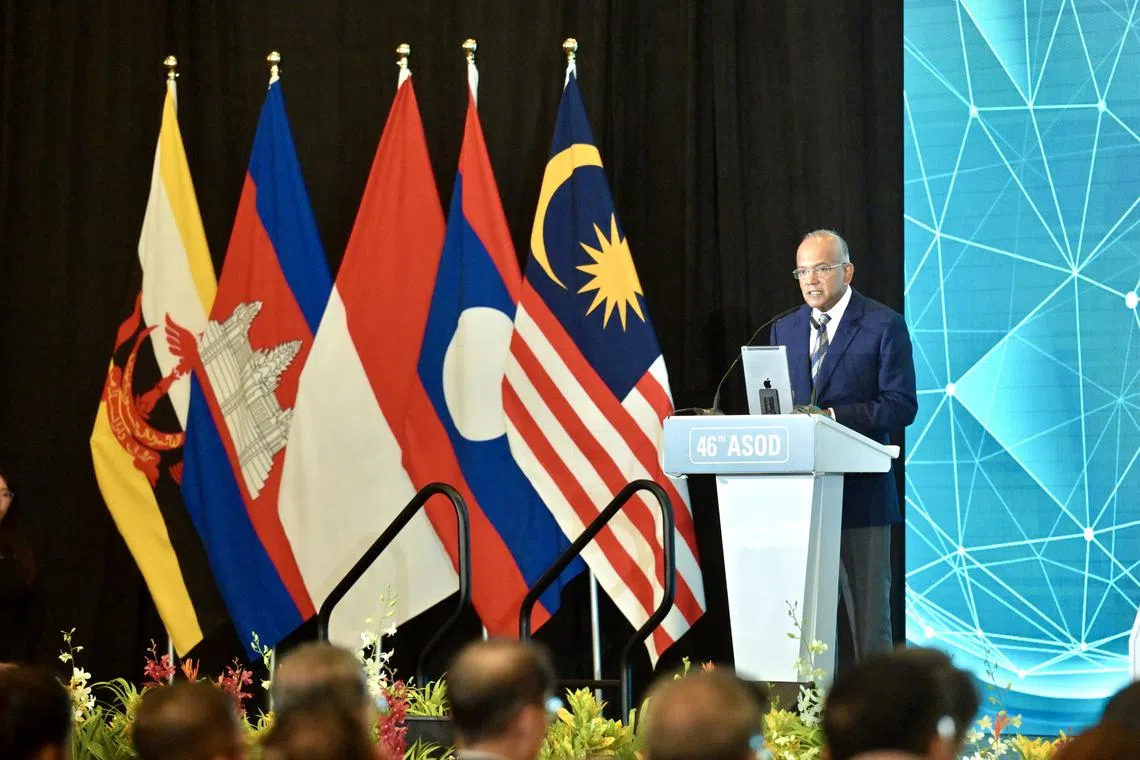Singapore proposes Asean joint statement to reaffirm commitment towards a drug-free region
Sign up now: Get ST's newsletters delivered to your inbox

Home Affairs Minister K. Shanmugam speaking at the 46th Asean Senior Officials Meeting on Drug Matters, held at Shangri-La Singapore, on Aug 26.
ST PHOTO: DESMOND FOO
- Singapore to propose ASEAN joint statement, reaffirming commitment towards a drug-free region, to be delivered at global meet.
- Home Affairs Minister K. Shanmugam said global drug situation continues to worsen, with more abusers and drug seizures.
- Domestic fight to tackle the drug scourge has to also include regional efforts due to transnational nature of the syndicates.
AI generated
SINGAPORE – Efforts by Singapore to tackle the drug scourge will see the Republic proposing an Asean joint statement to reaffirm a commitment towards a drug-free region.
Speaking on Aug 26 at the 46th Asean Senior Officials Meeting on Drug Matters held at Shangri-La Singapore, Home Affairs Minister K. Shanmugam said Singapore is proposing to deliver the joint statement at the 69th Commission on Narcotic Drugs.
“The statement will reaffirm our commitment towards a drug-free Asean, and express our concern about increasingly permissive attitudes towards drugs,” he added.
The commission, which is the governing body of the United Nations Office on Drugs and Crime, assists in supervising the application of international drug control treaties.
Mr Shanmugam, who is also Coordinating Minister for National Security, said that anti-drug approaches must go beyond the domestic fight to include regional efforts.
He noted that Singapore’s tough line on drugs has prevented syndicates from establishing themselves in the Republic and kept the problem under control.
He said that in 2024, the Central Narcotics Bureau conducted more than 1,000 operations at checkpoints to stem drug trafficking into Singapore, which led to the dismantling of more than 25 regional drug syndicates.
“I have little doubt that this is only a fraction of the number of syndicates which operate in our region,” he said, adding that regional efforts are also needed to tackle the scourge.
“Drug trafficking is a transnational crime. Drug syndicates exploit every possible legal loophole, every porous border, every weak link to peddle drugs to our people.”
Mr Shanmugam said Singapore is also proposing an Asean Drug Victims Remembrance Day to be observed every year on June 26, which is also the International Day against Drug Abuse and Illicit Trafficking.
Singapore holds a Drug Victims Remembrance Day
Said Mr Shanmugam: “On this day, Singaporeans from all walks of life gather to remember the victims who have been harmed by drugs.
“We hope that having a Remembrance Day at the Asean level will bring the serious consequences of drugs to the fore of public consciousness in our countries.”
He noted that to contribute to international capacity building, the Republic organises an annual Singapore Drug Control Programme.
Participants are given a view of Singapore’s harm prevention strategy, which includes upstream preventive drug education, tough laws and rigorous enforcement, as well as effective rehabilitation and aftercare programmes.
Since its first run in 2022, close to 80 senior officials from 36 countries have attended the programme.
In his speech, Mr Shanmugam said the global drug situation has continued to worsen. He cited the 2025 World Drug Report, which noted that more than 300 million people had reportedly abused a drug in 2023, an increase of 8 per cent from the previous year.
There have been more drug-related deaths as well.
In the United States, 500,000 Americans died due to drug overdose between 2020 and 2024, he said.
In Mexico, there have been about 460,000 drug-related homicides in the last 20 years.
Drug seizures have also hit unprecedented levels. Mr Shanmugam said that in 2023, cocaine seizures hit a record high for the seventh straight year.
Seizures of amphetamine-type stimulants, like methamphetamine, also peaked in 2023.
Mr Shanmugam said that against the backdrop of increased global drug production, the death penalty has kept the inflow of drugs into Singapore low.
“We impose it (capital punishment), and we execute people, and we explain why.
“There are groups going around who seek to romanticise and play up the stories of traffickers – many of them come from the region,” he said.
But Mr Shanmugam noted that there is strong support in the region for the anti-drug approach in Singapore.
A 2024 survey by the Ministry of Home Affairs showed that more than 80 per cent of the 12,000 respondents in six major regional cities said they feel safe to travel in Singapore and that the Republic’s strict laws have been effective in preventing crime.
“More than 84 per cent believed that the death penalty deters people from trafficking drugs into Singapore,” said Mr Shanmugam.
“When you walk around Singapore, you won’t find shops selling (drugs) openly, you won’t find people openly under the influence of drugs,” he added.
“You won’t find drugs being peddled in schools, and traffickers know that if they get caught, and there’s a high likelihood they will get caught, they will be facing capital punishment.”



